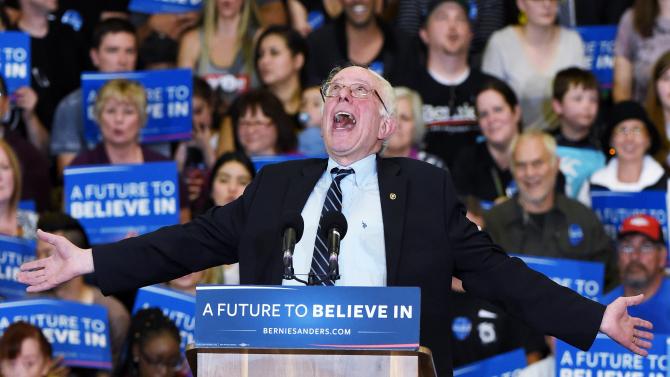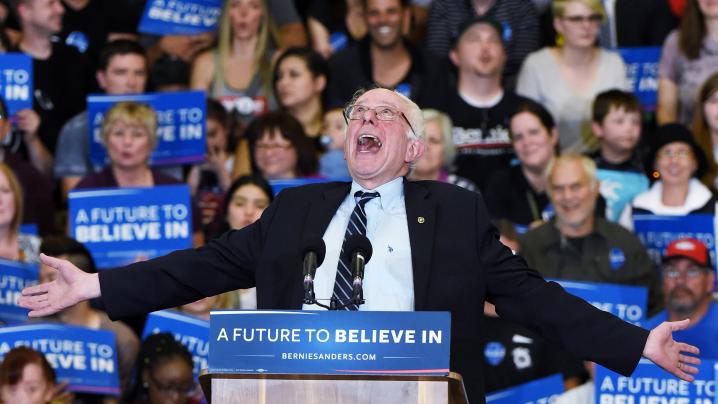[ad_1]

Democratic presidential candidate Sen. Bernie Sanders of Vermont jokes around as he speaks during a campaign rally at Bonanza High School in Las Vegas on Feb. 14, 2016.
Ethan Miller/Getty Images
Bernie Sanders has no reason to be angry. He’s done more to raise his profile in the last 18 months than he’s done in over 30 years in the House and Senate. He’s managed to drag the Democratic Party left after years of centrist posturing by Hillary Clinton and Barack Obama. He’s raised millions and galvanized millions more. However, he and his supporters still complain that the primary system is rigged and the Democratic Party isn’t treating them fairly.
It was the belief that the Democratic establishment is out to get Sanders that led to the violence and disruptions at the Nevada State Democratic Party Convention last week. This attitude is also the main reason Sanders has failed to consistently resonate with African-American voters. Black folks have always known that the system is rigged—what they want is someone to change it, not just complain about it.
Objectively speaking, there is a great deal to like about Sanders’ political positions, regardless of your party affiliation. Who isn’t in favor of taking money out of the hands of big business and putting it back into the pockets of consumers? Who isn’t in favor of making Washington, D.C., more accountable to voters? You may quibble with how Sanders proposes to accomplish his goals, or whether he can actually achieve them, but the goals themselves are pretty party-neutral, which is befitting a lifelong independent senator (more on that later).
Despite a strong message about economic inequality, Sanders has never managed to be competitive with African-American Democrats in primary states. Many have argued ad nauseam about why the Sanders campaign has struggled with black voters, and the arguments generally fall into two equally simplistic and nominally insulting categories: 1) Black folks are foolishly loyal to the Clintons in some form of electoral Stockholm syndrome; or 2) Black folks don’t ultimately know what’s best for them and don’t know Sanders well enough to realize that he’s the best choice.
I’ve avoided stepping into this fray because not only are both arguments faulty, but neither one in any way reflects the black Democrats and independents I know. The real reason Sanders has failed to connect with many mainline African-American Democrats is what happened at the Nevada convention May 14. Sanders and his surrogates represent a discomfiting liberal white privilege that has always made African-American voters feel ill at ease, even when ultimate goals are in sync.
Stop me if you’ve had this experience before: You are driving downtown on a Friday night with one of your white friends in the passenger seat. Suddenly, those all-too-familiar red and blue lights start to flash behind you and you’re pulled over. The police officer plays cops’ favorite game, which is to ask a lot of perfectly legal, but thoroughly insulting and inconvenient, questions in search of a post hoc rationalization for pulling you over to begin with.
While you try to calmly navigate the situation, your white friend is going ballistic now that real, live, actual racism is happening in front of him or her. Which hits you with two simultaneous feelings: first, that it’s nice your friend has your back; and second, annoyance that it took a routine example of racial discrimination for your friend to finally realize your daily reality. And your friend’s reaction, while sincere, is way out of proportion to the offense. If anything, it reflects a sort of alienating privilege. In a nutshell, Sanders is your white friend in the car.
Of course the Democratic primary system is rigged, Bernie Sanders. What else is new? Party systems have always been rigged—ask any African-American candidate over the last 100 years. Sanders is angry because the Democratic Party put debates on weekends to help Clinton? How about when the Republicans handcuffed Alan Keyes to keep him out of the Atlanta debates in 1996?
Sanders is angry because the Democratic National Committee state bosses are in the tank for Clinton? In 2008, then-Sen. Obama had to start his own national organization, Obama for America, because he knew that party leaders wanted Clinton. At no point did you see supporters of Obama or Keyes or half a dozen other black candidates throw chairs or make death threats because they were losing.
The problem with Sanders and his supporters goes even deeper, though. Sanders just became a Democrat about 15 minutes ago so that he could run for the party nomination. For almost 40 years he’s been a proud independent, remember? Legally and structurally, the Democratic Party has every right to make things difficult for a relative outsider to snag the nomination.
When Sanders complains that the Democratic primary is rigged against an independent candidate, he sounds like a white sorority complaining that they lost the step show on points because this year’s theme was “Dark and Lovely.” It takes a lot of gall to show up with a membership card so new the ink is wet and start complaining about the process. Now that same sorority is tearing up the gym, throwing chairs and threatening to go all the way to the Pan-Hellenic Council if they don’t get their way. Just because you lost something doesn’t mean it was stolen—unless you’re dipped in the kind of privilege that tells you something is owed to you to begin with.
African-American Democrats have every right not to like Hillary Clinton, who wore her white privilege like a ski mask in 2008 and whose policy history leaves a lot to be desired. But that doesn’t make the self-righteous complaining of Sanders any easier to stomach. Yes, Sanders has been a freedom fighter for progressive causes for decades, but when it comes to the Democratic primary, he and his supporters have been consummate whiners reeking of privilege.
You want to talk about a rigged system? Look at Shirley Chisholm, Keyes, the Rev. Jesse Jackson or, even better, ask Democratic state Sen. Maria Chappelle-Nadal of Missouri, Republican Lenny McAllister in Pennsylvania, or dozens of other African-American Democrats and Republicans who are actual long-term party members who were betrayed in their primaries. If Sanders wants to be a part of the system, he has to find a way to beat it, then take it apart from the inside—not start halfway, then begin flipping chairs when the numbers aren’t adding up in his favor. Protest appeals to black voters, revolution appeals to black voters, but whining doesn’t. It has not always been clear that the Sanders campaign knows the difference.
[ad_2]




















